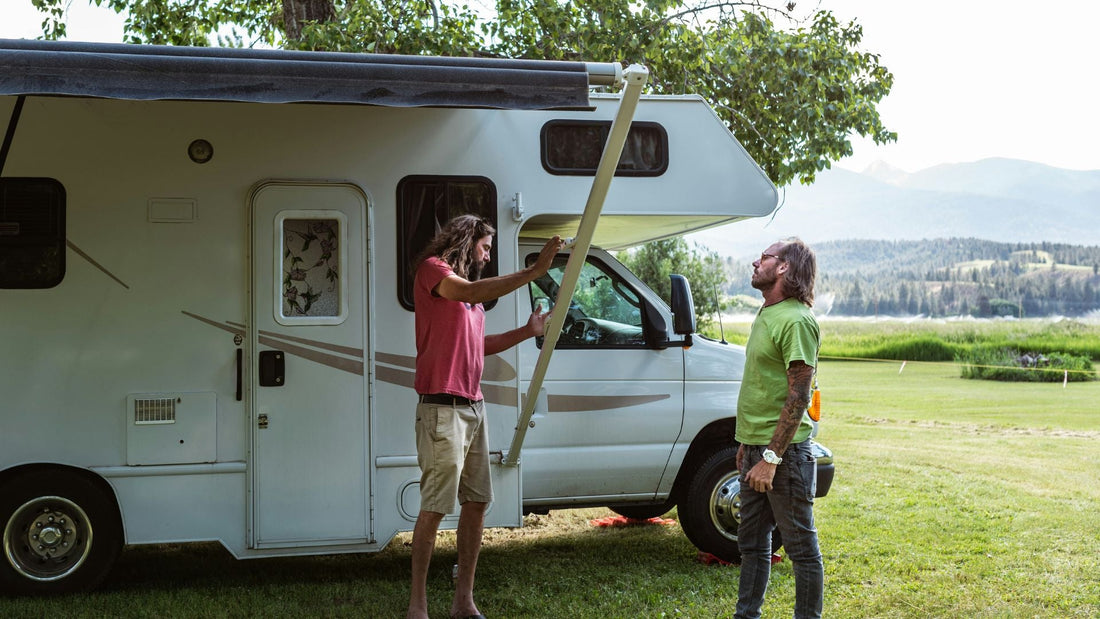When it comes to RV camping, having reliable power is crucial for a comfortable and enjoyable experience. Power inverters play a key role in this by converting DC (direct current) power from your RV's batteries into AC (alternating current) power that can be used to run household appliances and electronics. In this comprehensive guide, we'll explore what power inverters are, how to choose the right size inverter for your RV, and what to look for when buying one. We'll also dive into the benefits of pure sine wave inverters and highlight some top options from Rocksolar for Canadian customers.
What Is a Power Inverter?
A power inverter is an essential device for RV owners who want to use household appliances while off the grid. It converts DC power from your RV's batteries into AC power, which is the standard power type used by most household appliances and electronics. Without a power inverter, you would only be able to use the DC-powered devices directly connected to your RV’s battery system.
How Do Power Inverters Work?
Power inverters use electronic circuits to convert DC power into AC power. The basic process involves:
- Inversion: The inverter changes the DC voltage from your battery into AC voltage.
- Transformation: The inverter steps up or steps down the voltage as needed.
- Output: The converted AC power is then delivered to the outlets in your RV.
How to Choose the Right Size Inverter for Your RV
Selecting the right power inverter for your RV is crucial for ensuring that you have enough power to run all your essential appliances and electronics. Here are some key factors to consider:
1. Determine Your Power Needs
Start by calculating the total wattage of all the appliances you plan to use. This includes things like:
- Refrigerators
- Microwaves
- Laptops
- TVs
For instance, if you want to power a 1000-watt microwave and a 500-watt laptop simultaneously, you would need an inverter that can handle at least 1500 watts of continuous power.
2. Consider Peak Power Ratings
Inverters also have a peak power rating, which is the maximum power they can provide for a short period. This is important for appliances that have a high startup power draw, like refrigerators and air conditioners.
3. Choose Between Pure Sine Wave and Modified Sine Wave Inverters
-
Pure Sine Wave Inverters provide a clean, smooth wave of power that is compatible with all types of appliances and is ideal for sensitive electronics.
-
Modified Sine Wave Inverters are less expensive but may cause interference with some electronics and are not suitable for all appliances.
For the best performance and to ensure compatibility with all your devices, a pure sine wave inverter is usually recommended.
Can an Inverter Power a Whole RV?
Yes, a sufficiently powerful inverter can indeed power an entire RV. However, this depends on the capacity of both the inverter and the RV's battery system. For a whole RV, you may need a high-wattage inverter, such as a 3000-watt or 4000-watt model, depending on your power needs.
What Size Inverter Do I Need for My RV?
To determine the size of the inverter you need, follow these steps:
- List All Appliances: Identify all the devices and appliances you will be using.
- Calculate Total Wattage: Add up the wattage of all these devices.
- Add a Safety Margin: To avoid overloading the inverter, add a 20-30% safety margin to your total wattage requirement.
How Many Batteries Do You Need?
The number of batteries required depends on the total power consumption and how long you need to run your appliances. For example, if you are using a 3000-watt inverter and need to run it for several hours, you will need a battery bank that can provide sufficient amp-hours (Ah) of power.
Battery Capacity Calculation
To calculate the battery capacity needed, use the formula:
For instance, if you are using a 2000-watt inverter for 5 hours, with a 12-volt battery system and a depth of discharge of 50%, you would need:
What to Look for When Buying an Inverter for RVs
Choosing the right inverter involves several considerations:
1. Power Output
Ensure the inverter provides enough wattage for your needs. Check both continuous and peak power ratings.
2. Type of Inverter
-
Pure Sine Wave Inverters: Ideal for sensitive electronics and all types of appliances.
-
Modified Sine Wave Inverters: Cost-effective but may not be suitable for all devices.
3. Battery Compatibility
Check if the inverter is compatible with your RV’s battery system (12V, 24V, etc.).
4. Efficiency
Look for inverters with high efficiency to minimize energy loss.
5. Features
-
Remote Control: For convenience, especially if your inverter is mounted in a hard-to-reach place.
-
Safety Features: Such as overload protection, short circuit protection, and thermal shutdown.
6. Brand and Warranty
Opt for reputable brands that offer good customer support and warranties. Rocksolar provides high-quality inverters with excellent warranties.
Top Portable Power Inverters from Rocksolar
Rocksolar offers a range of power inverters suitable for RVs. Here are some top picks:
1. 500W 12V Pure Sine Wave Power Inverter
A compact and reliable option for smaller RVs or minimal power needs.
2. 1000W 12V Pure Sine Wave Power Inverter
Ideal for moderate power needs and provides clean, reliable power.
3. 2000W 24V Pure Sine Wave Power Inverter
Great for larger RVs with higher power requirements.
4. 3000W 12V Pure Sine Wave Power Inverter with Remote Control Panel
Perfect for those who need a high-capacity inverter with added convenience.
Conclusion
Selecting the right power inverter is essential for a successful RV camping adventure. By understanding your power needs, choosing the appropriate inverter size and type, and considering key features, you can ensure a reliable and enjoyable experience. With Rocksolar's range of high-quality pure sine wave inverters, you can be confident in the power and performance of your RV setup.




